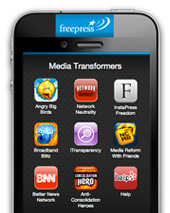|
News of the movement for December 21, 2012 |
|
Web Freedom at a Crossroads: The Stakes Are High
Dubai represents a clear sign of a troubling global dynamic. We should be fully prepared for the debate over Internet freedom to come up again at events like the 2013 World Telecom Policy Forum in Geneva and the 2014 ITU Plenipotentiary Conference in South Korea. The U.S. must and will continue to fight to preserve global Internet freedom. It won’t be easy, but it’s not optional. The stakes couldn't be higher. Behind Closed Doors at the U.N.'s Attempted 'Takeover of the Internet'
Though the world had been assured that the World Conference on International Telecom would not attempt to mount a “U.N. takeover of the Internet,” that was in many ways what happened.
Iran is not a huge fan of the Internet. The Iranian government has in recent years cracked down on Facebook, Twitter, Gmail and hundreds of independent websites and blogs -- and has even tried to create its own internal, state-sponsored version of the Web. Oddly, it has yet to train its crosshairs on Instagram, perhaps because the authorities don't yet view the hugely popular photo-sharing program, which isn't widely used in the country, as a threat.
Waters to FCC: Don't Wade Into Ownership Just Yet
The FCC continues to solicit comment from the public on media ownership and diversity, and Rep. Maxine Waters gave a piece of her mind to the chairman. Civil Liberties Groups Urge Senate to Debate Surveillance Bill
Civil liberties and privacy groups are urging the Senate to debate a handful of amendments aimed at beefing up the privacy protections in a controversial surveillance bill.
Nobody ever said that big cities make for easy living. The apps of the moment, Uber and Airbnb, try to mitigate matters by letting you book a car ride or rent someone’s apartment using your smartphone or computer. They are beloved by those contemplating scarce taxis or $500 hotel rooms. But they’re considerably less popular among city regulators, whose reactions recall Ned Ludd’s response to the automated loom. Apple Maps Three Times More Likely to Get You Lost Than Google Maps
How helpful is Apple Maps? Not very, according to a company that found Apple Maps is three times more likely to get someone lost than Google Maps. Apple Begins Appeal in Renewed Bid to Ban Samsung Phones
Apple today told a U.S. district court judge in San Jose it would appeal her decision earlier this week not to ban sales of a number of Samsung phones.
Why the U.S. Media Ignored Murdoch's Brazen Bid to Hijack the Presidency
Did the Washington Post and others underplay the story due to fear of the News Corp. chairman -- or was it simply tin-eared judgment? In Social Media and Opinion Pages, Newtown Sparks Calls for Gun Reform
The shooting rampage in a Connecticut elementary school last week triggered a conversation different from those that followed other recent U.S. gun tragedies. In addition to an outpouring of emotion, social media and the opinion pages of newspapers were used immediately to tackle the polarizing issue of the nation's gun laws, according to a special report by the Pew Research Center's Project for Excellence in Journalism. Predictions for Journalism 2013
To close out 2012, we asked some of the smartest people we know to predict what 2013 will bring for the future of journalism. Here’s what they had to say. The New York Times Paywall Is Working Better Than Anyone Had Guessed
Ever since the New York Times rolled out its so-called paywall in March 2011, a perennial dispute has waged. Anxious publishers say they can’t afford to give away their content for free, while the blogger set claim paywalls tend to turn off readers accustomed to a free and open Web. More than a year and a half later, it’s clear the New York Times’ paywall is not only valuable, it’s helped turn the paper’s subscription dollars into a significant revenue-generating business.
|
The Media Reform Daily will be taking a holiday break from Dec. 24-Jan. 1. We'll be back in the new year on Wed., Jan. 2, with the important media reform news of the day. Happy Holidays from all of us at Free Press!
What if there was a gadget that could fix everything that’s wrong with the media? At Free Press we have a people-powered machine that fights to change the media and build a better democracy. We can’t do this work without your support.
In Other News..Calling All CREDO Customers and Petition Signers! Senator Introduces Bill to Regulate Data Caps Instagram Changes Course and Reverts to Original Terms of Service for Advertising Your Internet Is Already on Your TV Adam Lanza Tried To Destroy His Hard Drive. Here’s How We Can Still Follow His Electronic Trail. Facebook Set to Change Your Timeline Again Facebook Testing Service to Let Strangers Pay $1 to Message You
|


